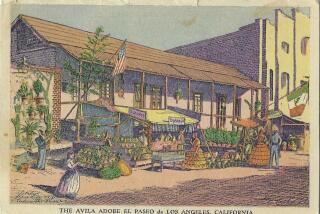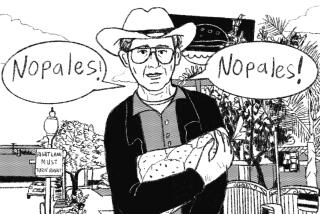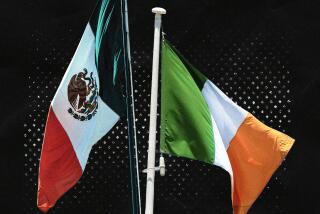Column: Vietnam through the eyes of Latino soldiers
The monument to all Mexican American veterans in Boyle Heights was dedicated in 1947 — the same year that a new generation of Latino soldiers, the Vietnam generation, was being born. The war in Southeast Asia ended 40 years ago; it would be another five years before the U.S. began counting Latinos separately in the national census. That sort of invisibility has made researching Latino veterans and Vietnam all the harder. Now Tomás Summers Sandoval, a Pomona College history professor, is amassing all the information he can, especially oral histories, before the soldiers — and their stories — begin to disappear.
Your father and uncle served in Vietnam. Is that what first piqued your interest in this?
In many ways this is the history that got me excited about history.
My dad’s Vietnam photo album, the pictures he sent to my mom, are not pictures of war. They’re pictures of a 20-year-old with other 19- and 20-year-olds in Vietnam. When I was a little kid, I enjoyed looking at pictures of Dad when he was really young, or seeing interesting things like a scorpion next to a Budweiser can for perspective. That made the war a part of my early consciousness.
The majority of fathers of the people I went to elementary school with were veterans. When you come from more working-class communities of color, you start to see how Vietnam didn’t evenly affect all communities.
What is some of the effect of the war on Latino communities?
There’s a whole span of ways: It animates a strong antiwar stance, a new way of understanding the role of the U.S. on the global stage. At the same time there are veterans who come back having a deeper sense of patriotism, of being connected to the nation, that they earned their citizenship.
One common thing is a mistrust of the institutions of the country that exists at the same time with a love of the country. They distinguish between a military apparatus, and a government apparatus that will take young men like them to fight. There’s a mistrust but at the same time a sense of pride in what they saw as their duty.
I spoke to a veteran who returned to East Los Angeles on Aug. 29, 1970, the day of the largest protest of the Chicano antiwar moment. The events of that day culminated in the death of [journalist] Ruben Salazar. Returning from war to his community, he saw another domestic war taking place. He witnessed a police officer hitting someone with a club, and his immediate response was to get in that fight and hit the officer. Places like East L.A. were like the rest of the country, negotiating the meaning of this kind of war.
How else would the Latino experience differ?
For Latinos, the major force of our history is the story of migration. A place like East Los Angeles is intimately connected to the jungles of Southeast Asia — a migration of a very different kind, reshaping a community’s sense of itself.
Latino veterans felt they were part of a cohesive unit. [The soldiers] were from different backgrounds, different parts of the country — they didn’t think about race. They thought about those men as brothers. A minority talk about some racial conflicts — being the only Latino in the unit or one of only two.
We hear often about Vietnam veterans having more problems with work, with homelessness, with family, than veterans of earlier wars.
I’ve been able to look at statistics to understand how Latino veterans and veteran households performed differently from nonveteran Latino households since the war. A lot of economic data suggest Latino veterans perform better. Latinos were such an undereducated, marginalized group in the 1960s that the military took those who would otherwise have been going off to college, so it’s self-selecting: You have to be educated enough to get into the military.
World War II veterans are better off than nonveterans over time. For Vietnam, the average white veteran has not performed as well over the last 40 years as their nonveteran cohort. [But] you can’t just conclude that military service is an economic boon to Latinos.
You say “perform.” How do you define that?
There are indicators associated with economic improvement, like education, earnings, homeownership, even divorce rates. The better your economic standing, the less likely you are to divorce.
Do the veterans you talk to want their kids to go into the military?
Most do not. I haven’t spoken to anyone whose child is in the military. Understanding the value [of having been in the military] in their lives — an opportunity to get discipline and acquire cultural skills — a few have said that would be good for young people in general. But most, no.
Was just being in Vietnam as eye-opening for some Latino vets as it was for other young soldiers?
I’ve interviewed men from the Central Valley. They grew up in small rural towns, went to Vietnam and saw that kind of rural poverty they had known. It opened up a connection between themselves and those they’d been sent to fight against. Other vets from places like East L.A. or Lincoln Heights tell stories of growing up thinking of themselves as really poor. Then they go to Vietnam and meet poor [soldiers] from the rural South, for whom [a pair of combat boots] is the first pair of new shoes they ever had. Those encounters changed their perspectives on themselves.
The patriotism you see in them is sometimes mixed.
Most who talked about their patriotism going into the war talk about how that patriotism was built. What comes up in almost all the interviews are John Wayne movies. He’s the stand-in for the cultural messages they were given about what it means to be a man, to be an American. They [now] see those kinds of movies and messages as a form of brainwashing. They say, well, I was raised on John Wayne movies or Audie Murphy movies. Now they see that as a kind of indoctrination, being prepared for war. Their experience of war has given them a vantage point to make sense of their earlier lives in ways [non-Vietnam veterans] might not.
Most of these men now have a sense of life being finite, and they’re aware of telling a story for future generations, to represent the realities of war. It would have been a very different thing to collect these stories in 1980, when people were still dealing with the effects of the war.
What individual stories have resonated with you?
A couple have talked about their experiences saying goodbye. Part of that was getting blessed: one by his mother and another by his grandmother. When they returned home, they’re blessed again, a circular cultural experience.
Another veteran talked about when he came back, his grandmother performed a limpia on him, a spiritual washing away of the war. He attributes this as the reason he hasn’t had many battles with post-traumatic stress.
Latinos have felt erased from the Vietnam experience in movies about the war.
When you look at Hollywood and even fiction and nonfiction books on Vietnam, the Latino experience is still an underrepresented one. It’s one of the challenges for historians who work on Chicanos and Latinos. We often think of Latinos as more current, of immigration as the issue of the late 20th and early 21st century, and before that, [Latino presence] wasn’t a thing. [But] it stretches back hundreds of years.
Latinos are the emerging majority in California. It’s important that that population have access to stories that make them understand [their] long history [here], and those are stories of war as much as stories of political movements for equality and rights.
This interview has been edited and condensed.
Twitter: @pattmlatimes
Follow the Opinion section on Twitter @latimesopinion and Facebook
More to Read
A cure for the common opinion
Get thought-provoking perspectives with our weekly newsletter.
You may occasionally receive promotional content from the Los Angeles Times.







